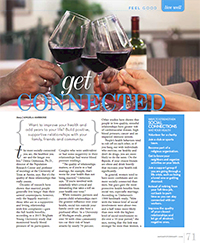 Want to improve your health and add years to your life? Build positive, supportive relationships with your family, friends and community.
Want to improve your health and add years to your life? Build positive, supportive relationships with your family, friends and community.
“The more socially connected you are, the healthier you are and the longer you live,” says Debra Umberson, Ph.D., director of the Population Research Center and professor of sociology at the University of Texas at Austin. But it’s the quality of those relationships that really counts.
Decades of research have shown that married people generally live longer than their unwed counterparts; however, only the happily married – those who are in a supportive and loving relationship with few complaints – gain the full health benefits, according to a 2015 Brigham Young University study that monitored hourly blood pressure of its participants. Couples who were ambivalent or had some negativity in their relationships had worse blood pressure readings.
“The quality of relationships matters, so if you’re in a bad marriage, for example, that’s worse for your health than not being married,” says Umberson. “If you’re involved with somebody who’s critical and demanding, that takes a toll on your health over time.”
While romantic partners and parent-child relationships exert the greatest influence over your health, social ties outside your family circle can also have a profound effect.
In a University of Michigan study, people over 50 with close community ties cut their risk of heart attacks by nearly 70 percent. Other studies have shown that people in low-quality, stressful relationships have greater risk of cardiovascular disease, high blood pressure, cancer and an impaired immune system.
People’s health behaviors tend to rub off on each other, so if you hang out with individuals who exercise, eat healthy and don’t do drugs, you are more likely to do the same. On the flipside, if your closest friends are obese and drink heavily, that ups your health risk significantly.
In general, women tend to have more confidants and are more socially connected than men, but guys gain the most protective health benefits from social ties, especially marriage.
According to Umberson’s 1988 landmark study, “Men with the lowest level of social involvement were about two and a half times more likely than men with the highest level of social involvement to die over a 10 year period,” she says, noting that the link was stronger for men than women. Subsequent research has supported this finding.
Ways to Strengthen Social Connections and Your Health:
- Volunteer for a charity.
- Join a club or sports team.
- Become part of a religious organization.
- Get to know your neighbors and organize activities on your block.
- Join a support group if you are going through a life crisis, such as losing a loved one or getting divorced.
- Instead of retiring from your full-time job, cut back to part-time so you can stay connected with co-workers.
- Most importantly, improve the quality of your closest relationships and let go of strained, negative ones.